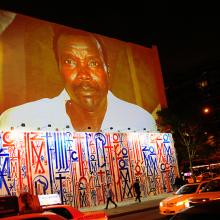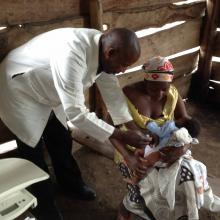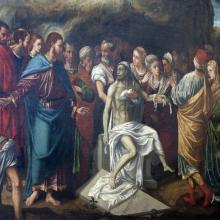Uganda
Uganda’s constitutional court refused on Wednesday to annul or suspend an anti-LGBTQ+ law that includes the death penalty for certain same-sex acts, but voided some provisions that it said were inconsistent with certain fundamental human rights.
IN MAY, UGANDA'S President Museveni signed a law that criminalizes same-sex sexual acts between consenting adults and allows for the death penalty in some cases. Homosexuality was already illegal in Uganda under a colonial-era law and punishable by life imprisonment. Uganda joins four other countries on the continent where being gay may be punishable by death.
When African leaders say that homosexuality is alien to African culture and is being introduced into Africa by Westerners, they are referring to African history that was strategically redacted over time by European colonizers and missionaries. This erasure was counter to original colonial annals that reflect exceptions to heterosexuality as far back as the 1500s. Portuguese documents identify esteemed same-sex male relationships in the kingdom of Kongo and a male-identified female warrior class in Dahomey.
One result of this redacted history is that in later anti-colonial struggles, African nationalists would uphold a moral “African” sexuality (one actually rooted in standards imposed by colonizers) against the immoral West, according to historian Marc Epprecht. Both religious and state power have been used to suppress LGBTQ+ people in African societies while also promoting heteronormativity for building the nation-state collective identity. Even today, “patriotic heterosexuality” is promoted by some state and religious leaders.
This religio-political system blurs the lines between state and religion. In fact, state power immediately positions itself as a tool for promoting collective Africanness within a particular nation-state, allowing it to make religion a partner in its use of force to control those it deems to exist at the peripheries of heteronormative society.
An example is in Uganda. The Anglican archbishop there has openly aligned the Anglican Church with the state authorities in ensuring that homosexuality is criminalized.
Luckily, the picture is not completely bleak.
How the “welfare state” is designed to subsidize affluence rather than fight poverty.
THE IMAGE THAT first brought Ugandan climate activist Vanessa Nakate to many people’s attention is one that doesn’t even include her.
In January 2020, Nakate was invited to join five other young activists in a climate demonstration during the World Economic Forum annual meeting in Davos, Switzerland. An Associated Press photographer snapped a photo of Nakate standing with European climate activists Luisa Neubauer, Greta Thunberg, Isabelle Axelsson, and Loukina Tille. But when the AP published the photo that afternoon, Nakate wasn’t in it.
“Even now, well over a year after being cropped out of that photograph, it’s hard for me to talk about what happened,” wrote Nakate in her 2021 book A Bigger Picture: My Fight to Bring a New African Voice to the Climate Crisis. “By cutting me out of the photo they’d originally sent to global media organizations, the AP had denied an African activist a chance to be seen and, possibly, her message to be acknowledged.”
While the AP did some “soul-searching” following the incident, Nakate used the moment to ignite an overdue conversation about the whiteness that has long plagued the global environmental justice movement. “Being cropped out of the photo changed me,” she wrote. “I decided, from my perspective as a young African woman, that I would dedicate as much of my time as possible to addressing the many interlocking facets of the climate crisis, environmental justice, and gender discrimination — and to do so without apology or fear of erasure.”
Nakate founded the Rise Up Movement to amplify the voices of climate activists from Africa and launched a fundraising campaign for the Vash Green Schools Project to bring solar panels and cookstoves to schools across Uganda. At 25, she’s busy. And faced with a global climate emergency, it makes sense. “I don’t often get asked what recharges me,” Nakate told me when we spoke in early August. “But for me, it’s my relationship with the Holy Spirit.”
Raised in an Anglican family, Nakate became a born-again Christian as a teenager. “Activism can be very hard and prayer and attending services (or, in Covid times, watching online) have been extremely important sources of love, grace, and support,” she wrote in the acknowledgments of A Bigger Picture.
“If I feel distraught or disturbed by anything, I know the Holy Spirit will remind me of the peace that surpasses all human understanding,” she later told me. I spoke with Nakate via Zoom about her Christian faith, the role social media plays in her activism, and why we can’t eradicate poverty without addressing the climate crisis. — Christina Colón
THE CLIMATE CRISIS is a moral crisis. What else should we call the willful choice to inflict hunger, disease, and suffering on those in the poorest circumstances?
At the same time, the climate crisis is an opportunity to allow God’s healing grace to enter our lives. As with every great failure of our collective conscience, the way forward begins with each of us standing up in faith and love to right the wrongs of the past. Around the world, faith communities are doing just that. As national governments fail to show the decisive and visionary leadership we need, faith communities are taking up the mantle of justice. Under the banner of the U.N.’s “race to zero” initiative, many faith communities are committing to meaningful changes in the way they operate to build a healthy, safe world that protects everyone.
It’s hard work, but it is the way of the future. In 50 years, the Earth’s fossil fuels will be depleted, and the world will no longer run on oil and gas. The only questions are how quickly we can make this change and whether we can make it well. Many faith institutions have chosen to put their pocketbooks to greater service by divesting from fossil fuel companies and reinvesting in clean renewable energy. To date, nearly 400 faith-based institutions have divested, constituting the single largest source of commitments in the global divestment movement. Committed institutions range from huge international networks to small communities of women religious, around the globe. It’s a big movement that is successfully pressuring oil companies to think beyond the status quo.
THIS YEAR, THE seasonal rains in Kenya came two months late. “Even the weatherman can’t forecast the weather,” Stephen Katama, a local shopkeeper in Nairobi, told me when I traveled to East Africa in June. “We can’t tell the difference between the summer and winter here anymore.”
During the past two decades, rain in sub-Saharan Africa has increased in frequency and intensity, creating dangerously erratic patterns of rainfall and drought. A single day’s downpour may bring the amount of rainfall normally expected over a period of eight months, wreaking havoc on the livelihoods of countless subsistence farming families across Kenya and Uganda.
Sub-Saharan Africa is among the regions projected to see the worst of climate change in the coming decades. I traveled with the Climate Witness Project, hosted by the Christian Reformed Church in the U.S., to Nakuru, Kenya, and North Teso and Soroti, Uganda, to visit farming communities facing extreme shifts in weather patterns.
IN THE SPAN OF OUR HOUR-LONG conversation, Mimi Mutesa, an emerging Ugandan-American photographer-videographer and an undergraduate student at Calvin College, a Christian Reformed school in Michigan, easily gives her thoughts on everything from the complexities of blackness to the policing of women’s bodies. However, when I ask her how her faith influences her work, there is a brief pause on the other end of the line.
“I don’t think it’s ever crossed my mind until this moment,” she says. When pressed, she explains that she’s “trying to tackle enough issues” in her art as it is, and evangelical culture has “far too many other problems” for her to address. Mutesa assures me that she still identifies as a person of faith but maintains that her relationship with God is “separate” from her relationship to art and social justice.
Perhaps this separation is a necessary one. It’s hard to imagine the average evangelical church embracing Mutesa’s colorful portraits of nude black joy. Her sentiments echo an unspoken opinion held by many young Christians, that if you want to be radical like Jesus was, you must do so on the margins of Christianity. More traditional folks may see this rush to the margins as a slick avoidance of the Christian call to profess one’s faith, or a symptom of postmodern discomfort with absolute truth. But what is more likely is that millennials of faith, especially millennials of color, want to engage with values traditionally cherished by the church but see modern-day Christianity as a direct hindrance to that sort of exploration, since significant portions of the church have been antagonists in struggles for social equality.
Reticence to conflate personal faith with artistic vision is deeply connected to a complex historical dialectic between the arts and the church: Mutesa’s midconversational pause is supported by precedent.

Cedric Crucke / Shutterstock.com
REMEMBER WHEN the Kony 2012 video went viral? The short documentary, produced by the controversial Invisible Children organization about brutal Ugandan rebel Joseph Kony and the Lord’s Resistance Army, purportedly reached more than half of young adults in the U.S. when it was released. Young Christians across the country swarmed their elected representatives, urging action against Kony, which quickly legitimized Obama’s deployment of U.S. military forces to hunt a relatively idle madman with depleted resources.
Since then, U.S. militarization in Africa has shown no sign of slowing. In 2006, according to The Intercept, “just 1 percent of [U.S.] commandos sent overseas were deployed in the U.S. Africa Command [AFRICOM] area of operations. In 2016, 17.26 percent of all U.S. Special Operations forces ... deployed abroad were sent to Africa.” The U.S. admits to the existence of one permanent base in Africa, in Djibouti on the Gulf of Aden, while U.S. special forces are deployed in “more than 60 percent of the 54 countries on the continent.”
Special operations and collaborations with proxy militias enable U.S. militarism in Africa to persist with very little public awareness or oversight—and wreak havoc on local populations.
“By keeping us in a state of perpetual war, the arms trade grows,” said Norman Tumuhimbise, a Ugandan youth activist kidnapped and tortured in 2015 by a branch of Uganda’s military that trains under U.S. anti-terror programs.
“This is a fast-growing humanitarian situation which we have never seen before,” said Benson Okabo, World Vision’s West Nile Refugee Response operations manager. “We are concerned that the donor assistance has been little.”
It was her desire to hear the stories of real people — “not just faceless refugees or immigrants” — that brought the Rev. Elizabeth A. Eaton to a refugee resettlement agency that provides a range of services to refugees in the Chicago area.
“Especially now, when there’s this fear that’s been stirred up, and anti-refugee sentiment, it’s really critical to say, ‘No, these people are our grandparents, our aunts and uncles,” said the presiding bishop of the Evangelical Lutheran Church in America, the nation’s largest Lutheran denomination.

A projection of Joseph Kony during Invisible Children's "Kony 2012" campaign. Image via REUTERS/Keith Bedford/RNS
A senior Roman Catholic bishop in the Central African Republic is warning that the Lord’s Resistance Army, a rebel force that killed more than 100,000 people in northern Uganda in the 1980s and ’90s, is rising up again in his country. Bishop Nestor Desire Nongo-Aziagbia said the LRA, led by self-declared prophet Joseph Kony, has become one of the biggest threats to peace in his country and in neighboring Democratic Republic of Congo and South Sudan.

Image via Anglican Communion News Service / The Press Association / RNS
Various factions within the Anglican Communion are jockeying for position as bishops of the world’s third-largest Christian tradition gather in Canterbury for the start of a six-day meeting to discuss the future of their communion.
But averting a split may not be possible.

Image via Drop of Light / Shutterstock.com
Pope Francis wrapped up his six-day trip to Africa in the war-torn Central Africa Republic on Nov. 30 by warning that religious conflicts are spawning civil war, terrorism, and suffering throughout the continent.
“Together we must say no to hatred, to revenge and to violence, especially violence perpetrated in the name of a religion or of God himself,” the pope said in Bangui, the capital.
“Together, we must say no to hatred, to revenge and to violence, particularly that violence which is perpetrated in the name of a religion or of God himself. God is peace, ‘salaam,’ ” the pope said, using the Arabic word for peace.
A growing number of LGBT Ugandans are fleeing to neighboring Kenya to escape violence and persecution, a Ugandan Catholic priest says.
People are beaten, raped, evicted, and dismissed from their jobs because of their sexual identity or orientation, the Rev. Anthony Musaala said during a talk at All Saints Catholic Church as part of a monthlong visit to the United States and Canada.
Even associating with or advocating for LGBT people may spur discrimination, he said.
Uganda’s top Anglican leader criticized the constitutional court for striking down the country’s controversial anti-gay law on a technicality, saying the law is still needed to protect children and families from Western-imported homosexuality.
A five-judge panel on Friday declared the Anti-Homosexuality Act, 2014, null and void since it was passed by parliament without the required quorum. Dismissing the law on a technicality maintains the possibility that it could be revived in a different form.
The law punishes homosexual acts with life imprisonment. President Yoweri Museveni signed the measure in February, drawing harsh criticism from Western nations and cuts in foreign aid.
Anglican Archbishop Stanley Ntagali called the decision a disappointment for the Church of Uganda, religious leaders and many Ugandans.
“The ‘court of public opinion’ has clearly indicated its support for the Act, and we urge Parliament to consider voting again on the Bill with the proper quorum in place,” Ntagali said on Monday.
April 24-30 is World Immunization Week. While it is estimated that vaccinations save the lives of 2.5 million children every year, another 1.5 million children die each year from diseases that can be prevented with vaccines. Christian organizations are working to change this and help the global health community reach the 20 percent of children worldwide who miss out on life-saving vaccines.
Sylvia, a mother of three in Kasese, Uganda says she was aware of vaccines to prevent disease, but did not understand their importance or the fact that children need a number of vaccinations throughout the first five years of life. “All I understood was that there are killer diseases we should immunize our children against,” explained Sylvia. “I took my first and second child for vaccines for only the first nine months of life. I didn’t learn my children would still be at risk of catching diseases if they were not immunized for five full years until an educator from the Bishop Masereka Christian Foundation (BMCF) came to my village.”
Reaching parents with information about vaccines and vaccinating children is critical to child survival. Immunization is one of the main drivers behind the tremendous decline in child deaths the world has experienced in recent decades.
Editor's Note: This post is adapted from a sermon preached by the Rev. Dr. Randle R. (Rick) Nixon.
Some of us have stood at a tomb, faced an open grave, scattered the ashes of one beloved. We know what it’s like to be confronted with the stark reality of death and the flood of conflicting emotions that comes with it. I’ve stood at different sites at Dry Creek Cemetery in Boise, Idaho, and the Veteran’s Cemetery next to it, to bury my father, my brother, my nephew, my step-father and-step sister, my brother-in-law, not to mention my beloved piano teacher, and a dear high school friend. Not so long ago I stood by the open grave of Patrice Heath as her casket was lowered into the ground. We prayed and wept and celebrated her life, but it is not an easy thing, under any circumstances, to lay a loved one to rest.
The ancient story of Lazarus being raised from the dead in John 11:1-45 is just such a situation. It’s also another occasion to encounter Jesus in his divinity and his humanity. It’s a long, complicated story. You have heard it read. I will not attempt to unpack it all.
American evangelicals are denouncing a new Uganda law that criminalizes homosexuality, reiterating a position that many have held for years but which has nonetheless drawn scrutiny and skepticism from critics.
Since 2009, several American pastors and leaders have condemned legislation in Uganda that in its initial version imposed the death penalty for some offenders. Under the revised law signed recently by President Yoweri Museveni, the death penalty was removed and replaced with life in prison in some cases.
Now, American evangelicals who insist they never supported either version of the law nonetheless find themselves playing defense, saying their statements against homosexuality at home are being twisted as an endorsement of harsh penalties against gays and lesbians abroad.
Ahead of his five-day visit to Africa, Archbishop of Canterbury Justin Welby issued a statement reminding Anglicans of the commitment the Church of England made eight years ago to the pastoral care and support of everyone, including gays and lesbians.
So far, the archbishop’s statement has not convinced African leaders.
On Wednesday, Anglican leaders in Africa rejected a proposal by the English College of Bishops for two-year “facilitated conversations” to address the differences over homosexuality within the worldwide Anglican Communion.
In the last month, many Westerners watched in horror as Uganda, and then Nigeria, enacted laws that are brutally repressive to lesbian, gay, bisexual, and transgender people.
The fate of a bill passed by the Ugandan parliament remains uncertain after President Yoweri Museveni refused to sign it, but news reports from Nigeria indicate that there have been mass arrests of gay men following President Goodluck Jonathan’s signing of the National Assembly’s anti-gay bill.
World leaders, including United Nations Secretary-General Ban Ki-moon and U.S. Secretary of State John Kerry, have expressed their dismay. Many Christian leaders around the world, regrettably, have been largely unwilling to criticize Christian leaders in Africa who cheered the passage of these punitive laws.















